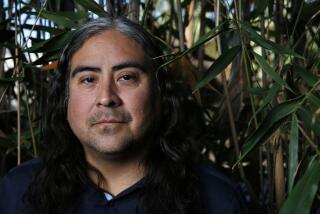Shorter ‘Fields’ Retains Emotional Impact
- Share via
The opportunity to see and hear a Pulitzer Prize-winning composition on national television is not exactly a common event. But Wynton Marsalis is not exactly a typical Pulitzer-winning composer, either.
His oratorio, “Blood on the Fields,” which airs on PBS’ “Sessions on West 54th” tonight in its television debut, is the first out-and-out jazz work ever awarded the prestigious prize. And the reasons for its choice--even in this condensed hourlong version (the original work runs close to three hours)--are fully apparent. Directly descendant from the music of such legendary jazz composers as Duke Ellington, Billy Strayhorn and Charles Mingus, “Blood on the Fields” is a kind of summing-up of 20th century jazz, a rich survey of song and improvisation set to Marsalis’ tale of African American survival and fulfillment.
The performance was taped in New York before a live, but largely unseen audience. Wisely, the cameras focus completely upon Marsalis, the musicians and singers Cassandra Wilson, Jon Hendricks and Miles Griffith.
What emerges is a strikingly intimate visual insight into the process of playing jazz music. As cameras rove from player to player, we see not only the individual musicians at work, but the reactions of their fellow artists-- pianist Eric Reed watching saxophonist James Carter, Wilson responding with a smile to Hendricks. And, in the moments when the focus is held upon one musician--Reed’s piano playing or Marsalis’ trumpet expositions, for example--the close-ups provide a gripping feeling for the intense, inner involvement that jazz playing demands.
This rendering of “Blood on the Fields” includes seven numbers from the full score of 21 separate segments. Among them, Hendricks sings stirring readings of “Soul for Sale” and “Juba and a O’Brown Squaw,” Wilson does “Work Song” (with Griffith) and a leisurely, blues-drenched “Will the Sun Come Out,” and the ensemble joins in for a climactic “Freedom Is in the Trying.”
A more immediately accessible way of hearing the score, it nonetheless possesses, despite its abbreviation, much of the emotional thrust and musical expressiveness of the full composition. As such, it probably has better potential for wider distribution and performance than the full-length work.
And, as television, it is a potent reminder that the process of making music can have a powerful visual impact, even without the distractions of technical video gimmickry.
* “Blood on the Fields” airs tonight at 11 on KCET-TV. It will also air at 10 p.m. on Aug. 10 on KOCE in Orange County.
More to Read
The complete guide to home viewing
Get Screen Gab for everything about the TV shows and streaming movies everyone’s talking about.
You may occasionally receive promotional content from the Los Angeles Times.






